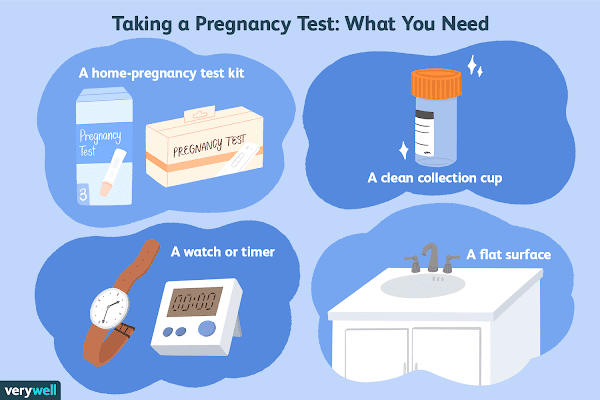While attempting to conceive may be optimistic and joyful, it can also be quite daunting due to the abundance of information available. Anyone may get worried due to the abundance of information (and misinformation) regarding conception and pregnancy. However, detecting a pregnancy does not have to be difficult. Allure chatted with two physicians to learn about at-home pregnancy tests: how they work, their accuracy, when to use them, and which ones to purchase. How do pregnancy tests performed at home work?
What are the many kinds of pregnancy tests available? Blood tests and urine tests are the two primary forms of pregnancy testing. Tests of the blood These are available at your doctor's office, although they are not as often utilized as urine tests. These tests may identify pregnancy around six to eight days sooner than a home pregnancy test, approximately six to eight days after ovulation. The findings are obtained more slowly than with a home pregnancy test. There are two kinds of pregnancy blood tests: A qualitative hCG test verifies the presence of hCG. It responds with a yes or no to the query, "Are you pregnant?" These tests are often ordered by physicians to confirm pregnancy as early as 10 days after conception. Certain individuals are capable of detecting hCG considerably early.
Following your first appointment, you will get prenatal care every four weeks. You will have a visit every two weeks throughout months 7 and 8. During your last month of pregnancy, you will have weekly visits until you deliver your baby. The doctor will examine your weight, blood pressure, and urine at each appointment. After the 20th week, the doctor will listen to your baby's heartbeat and measure the height of your uterus in your abdomen. You should always share any concerns or difficulties with your physician. Consider the following:
Certain tests, on the other hand, are more sensitive than others and may be performed early. hCG concentrations are expressed in milliInternational Units (mIU) or as a fraction of an IU per milliliter. A pregnancy test with a sensitivity of 20 IU/L detects pregnancy more accurately than one with a sensitivity of 50 IU/L. A blood test performed by your doctor is more sensitive than early home testing and may be performed between seven and twelve days after conception. However, these tests may be performed prematurely and provide a misleading negative result. If you obtain a negative result but continue to have irregular periods, another test should be performed.
When To Take A Home Pregnancy Test After Embryo Transfer
1. If the test is positive, Clearblue Advanced with Weeks Estimator will display the phrase âPregnantâ on the LCD, along with an estimate of the number of weeks since ovulation. This is accomplished by measuring the quantity of hCG in your urine. 2. The Double-Check and Date kit includes two tests: one to determine if you're pregnant and another to confirm your pregnancy and determine how far along you are.
Normal hCG levels vary widely in the blood and urine, and this large range affects the time of when pregnancy may be discovered. If a woman's blood hCG levels are normal but low, it may take several more days for the pregnancy to show up on a pregnancy test. 3. hCG level in urine
Is a pregnancy test performed after implantation hemorrhage always reliable?
Even after calculating the number of days required for an appropriate test result, it is important to bear in mind that, for example, in the event of ectopic pregnancy, the HCG level grows more slowly and intensely. Additionally, threatening miscarriage results in a decrease in the HCG level. These universal truths are not without exceptions (about 15-17 percent ). However, the risk of a false negative test exists. Similarly, a false negative pregnancy test result may occur as a consequence of testing too early (when the HCG level has not yet reached the minimal mark, subject to detection).
The birth of a child is a marvel that the whole family anticipates. However, there are instances where pregnancy is impossible or a disease develops that results in the embryo's demise during the early stages. In vitro fertilization (IVF) was created to assist such women. After each step is completed, a period of agonizing waiting follows. The expecting woman may not detect any changes in her body for up to two weeks after the embryo transfer. This does not indicate that no pregnancy exists. This can only be determined with a blood test.
When To Take A Home Pregnancy Test After Ivf Transfer
We need a urine test 15 days after patients have completed an artificial insemination cycle, either with partner or donor sperm. This is in contrast to an in vitro fertilisation cycle utilizing either own or donor eggs, for which patients are required to submit to a urine test 16 days following egg harvest or on the day of egg donation. Patients are also requested to validate their findings with a beta-hCG blood test in this situation.
Utilizing an at-home pregnancy test after IVF may result in false positives or negatives. When our clinic performs an official pregnancy test, these incorrect findings might make patients feel thrilled or upset. Rather than doing a home pregnancy test after IVF, it is recommended that you wait until an official test can be conducted at our facility.
You may be overjoyed to finally visit a "normal" doctor! Additionally, you may feel apprehensive. It may be fairly jarring to go from intensive IVF monitoring to the more relaxed, once-a-month appointments of a normal OB/GYN. Do not be afraid to speak with your doctor. If an additional ultrasound will assist in calming your anxiety, go ahead and request it. Your doctor is aware of the lengths you've gone to in order to conceive. Nervousness is very natural and reasonable.
What if the test results are negative after embryo transfer? The lady may do a second analysis if she so desires. However, while selecting a good test strip, it is necessary to consider its sensitivity: the lower the numerical indication shown on the packaging, the greater the reagent's susceptibility to hCG. Certain inkjet and cassette tests offer a sensitivity of up to ten milliunits per milliliter. It is possible to determine the effectiveness of IVF as early as 8-9 days after embryo implantation with their assistance. The test's characteristics
When To Take A Home Pregnancy Test After Implantation Bleeding
What are the many kinds of pregnancy tests available? Blood tests and urine tests are the two primary forms of pregnancy testing. Tests of the blood These are available at your doctor's office, although they are not as often utilized as urine tests. These tests may identify pregnancy around six to eight days sooner than a home pregnancy test, approximately six to eight days after ovulation. The findings are obtained more slowly than with a home pregnancy test. There are two kinds of pregnancy blood tests: A qualitative hCG test verifies the presence of hCG. It responds with a yes or no to the query, "Are you pregnant?" These tests are often ordered by physicians to confirm pregnancy as early as 10 days after conception. Certain individuals are capable of detecting hCG considerably early.
Bleeding During Implantation Following ovulation, the egg enters the uterus and burrows into the uterine lining. Implantation may produce mild bleeding or spotting in some women. This condition is referred to as implantation hemorrhage. This is often mistaken for an early era. What is the appearance of implantation hemorrhage or spotting? Implantation bleeding, sometimes referred to as implantation spotting, does not resemble a normal menstrual cycle. Implantation bleeding is minimal and often manifests as a pink or brownish discharge. Is it menstruation or implantation bleeding? Implantation bleeding often happens a week to a few days before to the onset of your menstruation. Spotting that occurs about one week after ovulation is almost certainly implantation bleeding; however, spotting that happens extremely close to the time your period regularly begins may not be. A typical menstrual period begins mild and gradually becomes heavier. Spotting may sometimes be a symptom of an impending menstruation. If this is the case, the spotting will become more intense and the bleeding will become more noticeable. Spotting might be more perplexing if it occurs around the time your period would regularly begin. To determine pregnancy, you must either wait and see or use a pregnancy test.
The procedure through which the embryo connects to the uterine lining is called implantation. The embryo's connection to the uterine lining enables it to absorb oxygen and nutrition from the mother and continue growing until it develops into a baby. After development is complete, the embryo starts producing the hCG hormone. It is a hormone that causes a pregnancy test to be positive. HCG is critical throughout the first trimester. When you are not pregnant, a decrease in the hormone progesterone triggers the onset of your monthly period. However, the presence of hCG signifies the continuation of progesterone synthesis and the maintenance of the uterine lining during pregnancy.
The majority of patients do not exhibit any distinct indications or symptoms of implantation. A tiny percentage of pregnant women have implantation bleeding. Implantation bleeding is often limited to very little spotting. However, due to the time, it may occasionally be mistaken for a menstrual period or even a first-trimester miscarriage.
















